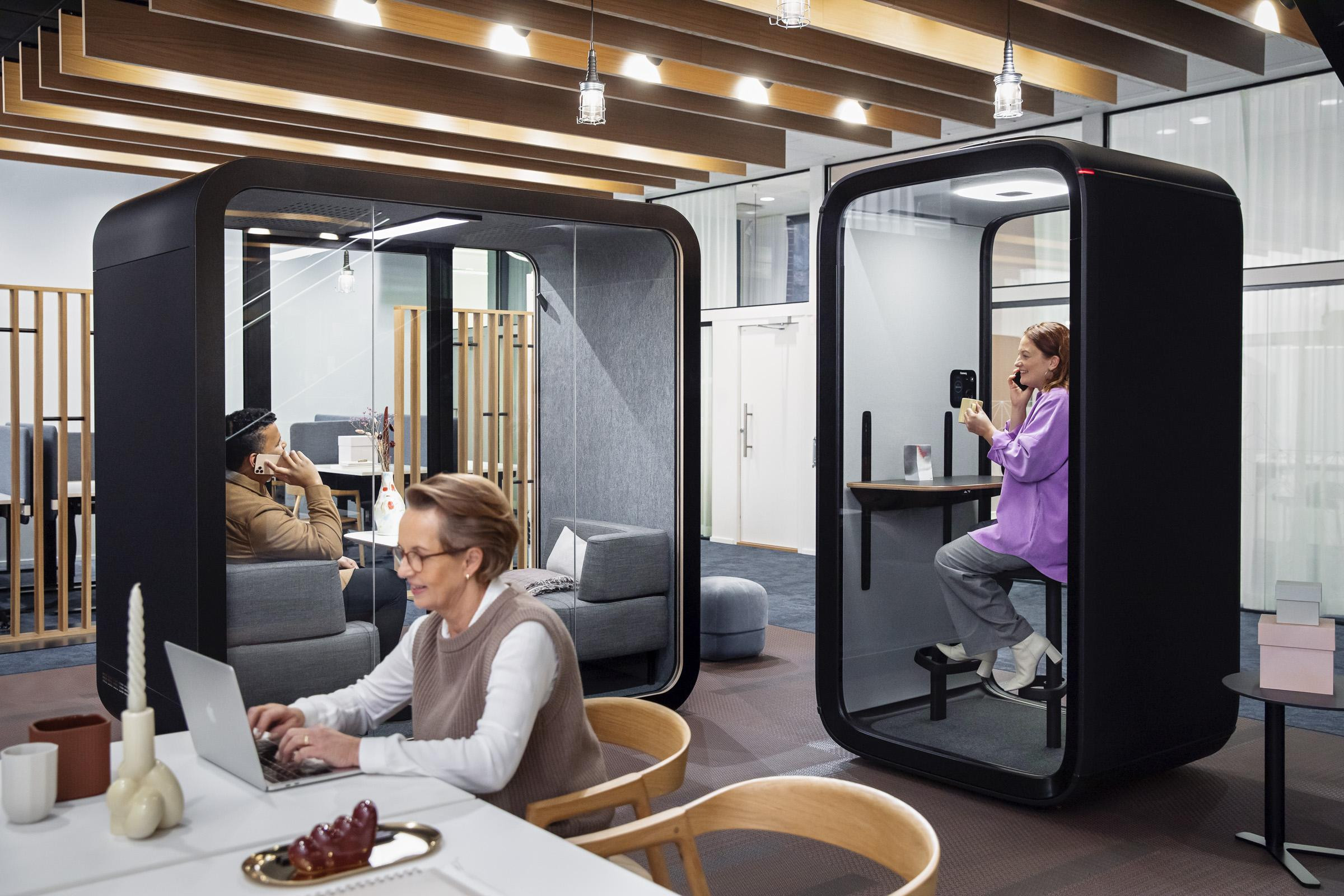The New Era of Work-Life Balance: A Shift in Perspective
If you've worked in an office, there's a tried-and-true, semi-annual ritual you'll know well: the office get-together. Prepandemic, it was communal pizza in the lunchroom, a $20-or-less Secret Santa gift exchange at the holiday party or maybe even an HR-approved scavenger hunt around your city with after-work drinks. During the pandemic, the fun shifted; perhaps it was a Zoom magic show to connect with co-workers during a trying time, or an online bread baking class. Regardless of the specifics, the parameters were clear – the goal was for bonding, and it was supposed to be fun.
Now, with workplaces in gradual stages of return-to-work and employees rethinking their relationships with their jobs, how companies work to cultivate culture and community has changed. “We moved away from the notion that the end of year Christmas or holiday party equals culture,” says Shawn Hewat, the chief executive and co-founder of Wavy, a company that helps businesses run team-building experiences. For Ms. Hewat, whose company specializes in experiences for distributed teams, this means a shift from larger, more generalized get-togethers or activities to more specialized and unique ones.
This can look different from team to team. It could be focusing on mental health because that’s an important part of your culture, Ms. Hewat says. Or, it might mean foregoing live, group social events because leadership recognizes that the team would rather participate in some sort of learning program throughout the year. “[That] may be more valuable [to a team] than a weekly happy hour – and more cost effective.”
While this shift in perspective around enforced-fun corporate events was going to happen inevitably, it was accelerated because of the COVID-19 pandemic, says Ms. Hewat. “It forced us to start rethinking what work/life balance looks like, why we’re doing this anyways, and what value it has to us and to each other.”
The Rise of 'Quiet Quitting' and The Great Resignation
Increasingly, that value prioritizes rest and life outside of a 9 to 5. A recent report from recruitment company Hays found that 53 per cent of workers in Canada have negative feelings about work, with nearly 30 per cent of those workers feeling tired and overworked. A July, 2023, report from Telus Health found that 21 per cent of Canadians were considering leaving their current jobs due to their mental health. We’ve seen it in action, with mass burnout, especially among millennial women, leading to the rise of “quiet quitting” and the Great Resignation.
“[These terms] came up for a reason because people are finding that the struggle [is] so real,” says Natasha Singh, co-founder of Re-Work, an organization focused on helping individuals and teams redefine their relationship to work. The struggle of work/life balance is one Ms. Singh knows well. Having worked in tech and fashion throughout her 20-year-career, she says she experienced burnout and watched her friends and co-workers go through it, too.
Ms. Singh and her co-founder Chantaie Allick founded Re-Work with the goal of making work sustainable for everyone, and she says part of that process is understanding that what constitutes fun – the activities that people find rejuvenating and authentically validating – isn’t one-size-fits all.
”There’s no one formula for [play],” Ms. Singh says. “To do yoga at work is not actually beneficial for everybody.”
The Evolution of Team-Building Events: Beyond the 'Mandatory Fun'
Since launching in 2020, Ms. Hewat and her team at Wavy have helped companies run several “choose-your-own-adventure”-style programs for organizations, such as a wellness week for Canadian company 7Shifts that featured a menu of online and in-person options for employees to choose from. They organized an updated holiday party format for another company that allowed employees to choose between in-person activities, remote cooking and game options and activities completely on their own time.
”[The company] had an option where team members could get gingerbread house ingredients shipped to them, and there was nothing live to join,” Ms. Hewat says. This allowed participants to fit the activity into their lifestyle and schedules, while still providing a point of connection among employees during work calls.
”It’s small, but super impactful,” Ms. Hewat says. “That’s a really interesting way of looking at building connections or building community when people are in different time zones or different places [and] they’re not necessarily bumping into each other in the hallway.”
”It’s [about] continuing to create that sense of belonging, recognition and celebration in the workplace, while also recognizing the holistic person that comes to work every day,” says Renita Manj, the Vancouver-based senior manager, employee experience and events, for Arc’teryx.
For Ms. Manj and her team, this has meant putting more emphasis on inclusivity, wellness and flexibility with virtual learning and wellness programs and opportunities for employees to professionally develop; while still implementing some of those larger, in-person events you’d expect from a big company. In 2022, the brand launched their Arc’Adventure Program, a rewards program that sends nominated employees on an all-expenses paid vacation to a locale that fits within the brands tenants of “climb, trail and snow.”
So far, the program has taken employees to Colorado, Utah, the Canadian Rockies and Italy, with plans to expand to other regions.
”Seeing the impact we’ve had on people with this program, providing those opportunities, has been super fulfilling,” Ms. Manj says. “The stories that come out of it, people going beyond their comfort zone, bringing together a group of 10 people across the business that have never met [and create] that sense of community, it’s quite special.”
Authentically investing in employees is worth it for everyone, she adds.
”When employees feel valued and connected to the company, it shows,” Ms. Manj says. “You see the results in productivity and job retention when they feel valued and they have a sense of belonging.”
The Paradox of Forced Socializing: Why It Often Backfires
Have you ever felt the paradox of craving genuine social interactions at work, yet finding mandatory office gatherings utterly uninspiring? As a recently promoted manager, you're not alone in facing this challenge, especially in the era of teams returning to the office.
Imagine this: You're back in the office, surrounded by your team. There's an air of expectation for reconnecting, for reigniting those workplace bonds that ostensibly fuel collaboration and innovation. Yet, beneath this surface, there's an undercurrent of discomfort, a silent protest against the very act of being mandatorily corralled into a physical space. This is the paradox of forced socializing.
At its heart, the Eptura Workplace Index, involving an analysis of 2.6 million desks across 8,000 companies and responses from 6,714 employees, captures this dilemma vividly. For many non-managerial staff, socializing emerges as the primary draw to the office. This preference for proximity to their teams (47% favoring this setup) underscores the value of voluntary rather than enforced interactions for authentic connections.
Employees, on the one hand, express a desire for connection, ranking socializing with colleagues as a top priority. Yet, paradoxically, when this socializing is mandated through enforced office attendance, it often breeds resentment rather than fostering the desired connection. It's a classic case of a well-intentioned strategy missing its mark, akin to inviting friends to a party only to find out they came out of obligation rather than desire.
Why does this happen? The answer lies in the nuanced nature of human relationships and the value we place on autonomy. When individuals choose to engage socially, it's often under conditions they find comfortable and environments they deem conducive. Forced social settings, especially in a professional context, strip away this sense of choice, making interactions feel less genuine and more like a chore.
Research by Uziel & Schmidt-Barad (2022) in the Journal of Happiness Studies illuminates the importance of choice in social interactions. They conducted an experiment putting participants through a 10-day simulation of real-world social scenarios. Individuals experienced four distinct social settings: electing solitude, choosing companionship, mandatory group activities, and forced isolation.
The results revealed that freely chosen socialization was most beneficial for elevating mood and subjective well-being. On the flip side, obligatory group time against one’s wishes proved the most detrimental to positivity and enjoyment. Forced isolation also dampened spirits but to a less extreme degree than coerced company. Ultimately, the takeaway is that agency and autonomy in sculpting one’s social landscape are pivotal to emotional prosperity. Whether mingling or reflecting solo, having control over that decision makes all the difference.
Reimagining Workplace Socializing: From 'Mandatory Fun' to Authentic Connections
BBC reported on a major shift in how we view work and, by extension, work-related socializing. The sudden and extended shift to remote working meant that traditional office-based social activities were no longer feasible. Virtual alternatives like Zoom happy hours or online team-building activities emerged, but they couldn't fully replicate the in-person experience and, in some cases, added to the Zoom fatigue.
As companies gradually call employees back to the office, the nature of “fun” at work is being re-evaluated. In today's hybrid work environment, where some team members may be in the office while others are remote, organizing inclusive and genuinely appealing events has become more challenging. Moreover, the pandemic has prompted many to realign their priorities, often placing greater value on personal and family time over workplace socialization.
The concept of “mandatory fun” is being replaced with a more nuanced approach. There's a growing recognition that team bonding and social events should be things that employees genuinely want to attend – not because they feel coerced or fear being labeled “not a team player.” This shift represents a broader movement towards respecting individual preferences and acknowledging that forced socialization can often be counterproductive.
Smart managers are now focusing on identifying types of “fun” that resonate with their employees. These might include more relaxed, informal gatherings, events tied to shared interests, or opportunities for volunteering and community engagement. The goal is to create spaces and events where employees feel naturally inclined to participate, fostering authentic connections and a sense of community.
This evolution away from mandatory fun towards more authentic, employee-driven socializing reflects a deeper understanding of what truly motivates and engages people. It's about creating a workplace culture that values the individual, offers flexibility, and recognizes that the best kind of team spirit is the one that's voluntarily and enthusiastically embraced.
Creating Genuine Bonding Opportunities: The Importance of Choice
Adam Waytz, a professor of management at the Kellogg School of Management at Northwestern University, offers insights into creating more genuine bonding opportunities. He highlights the effectiveness of casual, unforced socializing spaces, like a do-it-yourself coffee station. Such initiatives encourage spontaneous interaction without the pressure of structured social events.
By balancing the need for structured and unstructured socializing opportunities, respecting individual preferences, and fostering a culture of inclusivity and flexibility, leaders can help teams thrive in this new era of work. Remember, the key to successful team-building lies in understanding the unique dynamics of your team and adapting your approach accordingly.



















